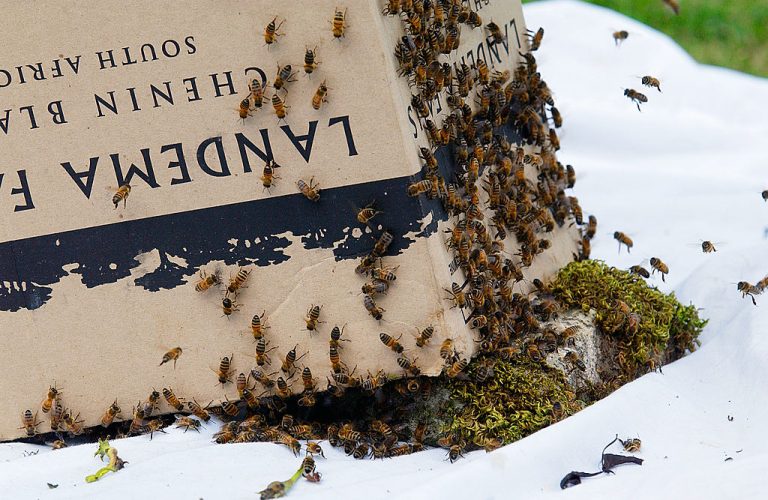A heartbreaking story emerged the week of April 25 when reports that the majority of a shipment of five million honeybees en route to Alaska to pollinate apple tree nurseries had died after airport staff left the pollinators upside down in the baking sun for hours.
Atlanta NPR/PBS affiliate WABE reported the story of a desperate April 24 rescue mission that emerged after 600 pounds of honeybees making the journey from Sacramento to Anchorage had first been waylaid, and then subsequently stranded for days, at the Hartsfield-Jackson Airport.
The article stated that the bees were initially kept in a Delta Airlines cargo bay for four days, but after they started to escape, airline staff put the bees outside on the tarmac.
SAVING THE HONEYBEES
- Is Bee Theft Contributing to the Decline in the Honeybee Population?
- 5 Hives of Honey Bees Survive a Volcanic Burial
- 4 Things You Can Do to Help Bring Back the Bees
WABE’s article chronicled the efforts of the Metro Atlanta Beekeepers Association (MABA), who hurriedly dispatched members to the airport in a desperate attempt to save however many they could.
One MABA member told the outlet they found “just clumps of dead bees that had no chance because they were left outside with no food and basically got lost in Delta’s machinery.”
Success
You are now signed up for our newsletter
Success
Check your email to complete sign up
An April 28 New York Times article described the shipment as 200 crates large and noted that the receiver, beekeeper Sarah McElrea, arrived at the airport in Anchorage on April 22 to collect her babies, only to discover the shipment had been stranded in Atlanta.
FOOD SHORTAGE AND SUPPLY CHAIN CRISIS
- This Oil Used In Oreos and Toothpaste Is 10% More Expensive After World’s Largest Producer Bans Exports
- Critical US Power Grid Hardware Wide Open With Backdoors, Warns CISA
- No Gas, No Food, No Electricity? Sri Lankans Siege President’s Home In Outrage
McElrea told NYT she was concerned because honeybees need to be sustained with sugar water and kept cool while in transit, lest they perish along the way.
Although Delta put the crated bees in a cooler upon request, the article stated that McElrea was contacted the next day on April 23 and told that an additional delay would be endured, resulting from loading problems with the only flight that day.
But on April 24, a Sunday, Delta again contacted McElrea to inform the beekeeper that staff had moved the 200 crates onto the tarmac in the 83 degree (28.3 C) sun after some had reportedly escaped.
By the time MABA member Edward Morgan arrived that afternoon after the call to action was issued, he told NYT that a quarter of the pollinators were already dead.
Morgan was further paraphrased as stating he discovered “that the containers had been placed upside down, making it impossible for the bees to reach their food.”
“For hours, they broke through the packages to see if any of the bees could be salvaged. But piles of thousands, then millions, of their lifeless bodies kept growing, as the beekeepers examined the packages,” read the article.
In an April 29 AP wire article, a Delta spokesperson claimed the company “quickly engaged the appropriate internal teams to assess the situation,” characterizing the calamity as an “unfortunate situation.”
AP characterized the calamity as “most” of the bees having died, while NYT stated “very few survived.”
McElrea told AP that the Sacramento-based supplier of the honeybees undertook to replace the shipment, valued at approximately $48,000.
Honeybee production data
According to the United States Geological Survey (USGS) website, a federal entity, honeybees are not native to North America and were imported from Europe in the 17th Century.
The USGS acknowledges a well known problem of the honeybee population “declining in recent years due to many factors, creating concern about the future security of pollination services in the United States.”
The USGS states that each colony gathers a remarkable 40 pounds of pollen and 265 pounds of nectar each year.
According to a March of 2022 report on the state of honey by the United States Department of Agriculture (USDA), although 2021 production totalled 126 million pounds, the figure represented a 14 percent decrease compared to 2020.
The report noted that although the 2.70 million colonies housed in the United States was only “down slightly” from 2020, the production shortage was primarily caused by reduced production yields.
Colonies producing 54.5 pounds of honey in 2020 only produced 46.9 in 2021.
The Canadian Honey Council (CHC) estimates an average colony size of 30,000 bees, noting the figure ranges dramatically from 10,000 to 15,000 in the spring to 50,000 to 80,000 in the summer as the insects proliferate.
Based on an average colony of 30,000 bees, the U.S. honeybee population would be approximately 81 billion strong.
The CHC states it takes one colony to pollinate a single acre of fruit trees, meaning the Anchorage shipment would have been able to handle approximately 166 acres of apple trees.
Website Tree Plantation states that orchards utilizing a standard 20-30 foot tree spacing grow as many as 30,000 apples per acre, per year, noting that high-yield planting schemes can double this number.
Based on this calculation, 166 acres of apple trees will produce approximately 4,980,000 apples if pollinated correctly.
WhatThingsWeigh states that a medium sized apple weighs about 6 grams, which works out to 0.375 pounds.
23.5 million pounds of honey were held in U.S. inventories as of mid-December of 2021, reported the USDA, but that figure was down a staggering 41 percent from the year prior.
Additionally, although the price of all colors of honey had increased for co-op and private producers from an average price of $1.84 to $2.30 per pound—a 25 percent jump—between 2020 and 2021, the retail price had actually decreased by 3.7 percent from $5.23 to $5.04
















